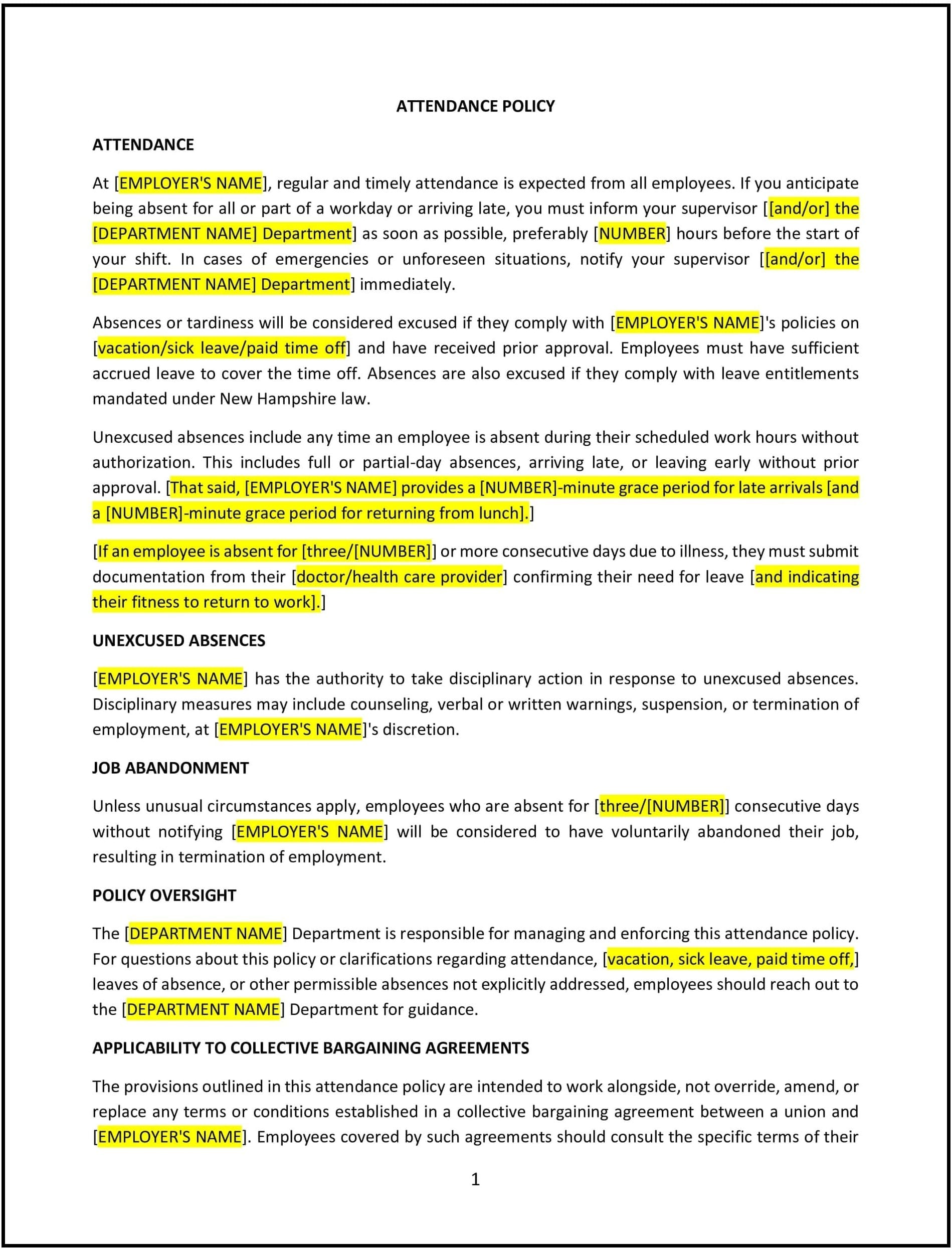Got contracts to review? While you're here for policies, let Cobrief make contract review effortless—start your free review now.

Customize this template for free
Attendance policy (New Hampshire)
An attendance policy helps New Hampshire businesses establish clear guidelines for employee attendance, including expectations regarding punctuality, absences, and how to request time off. This policy outlines the company’s procedures for managing attendance, ensuring fairness and consistency in handling absenteeism and tardiness.
By adopting this policy, businesses in New Hampshire can maintain smooth operations, promote productivity, and establish clear expectations around time off, helping to minimize disruptions caused by employee absences.
How to use this attendance policy (New Hampshire)
- Define attendance expectations: Clearly outline the company’s expectations regarding employee attendance, including punctuality, attendance during scheduled shifts, and the importance of notifying the employer when absent.
- Set procedures for requesting time off: Specify how employees should request time off, including how much notice is required and the acceptable methods for submitting a request (e.g., email, phone call, or an online system).
- Address acceptable reasons for absence: Outline the types of absences considered acceptable (e.g., illness, family emergencies, medical appointments) and the documentation required (e.g., doctor’s notes, proof of emergency).
- Define consequences for excessive absenteeism or tardiness: Specify the consequences for habitual absenteeism or tardiness, such as progressive discipline or corrective action.
- Offer options for paid or unpaid time off: Clarify whether absences will be paid or unpaid, and whether employees can use accrued paid time off (PTO) for planned or unplanned absences.
- Provide guidelines for unplanned absences: Set clear expectations for unplanned absences, including how employees should notify the company and the time frame for reporting their absence.
- Address attendance tracking: Specify how attendance will be tracked, whether through manual logs or an automated system, and how employees can access their attendance records.
- Review and update: Regularly review the policy to ensure it is aligned with New Hampshire state laws and business operations.
Benefits of using this attendance policy (New Hampshire)
This policy provides several benefits for New Hampshire businesses:
- Promotes consistent attendance: Establishes clear expectations for attendance and absenteeism, reducing confusion and helping employees understand the impact of their absence.
- Enhances productivity: Reduces disruptions caused by absenteeism or tardiness, ensuring that business operations run smoothly and employees can work efficiently.
- Supports business planning: Helps businesses plan for staffing needs by setting guidelines for time-off requests, making it easier to accommodate employee schedules and prevent overstaffing or understaffing.
- Improves employee accountability: Encourages employees to take responsibility for their attendance and work hours, ensuring that everyone contributes to maintaining a productive workplace.
- Reduces legal risks: Helps businesses address absenteeism and tardiness issues consistently and fairly, reducing the risk of potential legal disputes related to attendance policies.
Tips for using this attendance policy (New Hampshire)
- Communicate the policy clearly: Ensure that all employees are aware of the attendance policy, their responsibilities regarding time off, and how to report absences.
- Be flexible when possible: While maintaining business needs, allow for flexibility where appropriate, such as providing options for working from home or adjusting schedules in case of unforeseen circumstances.
- Maintain accurate records: Track employee attendance regularly and keep records up to date, ensuring that all absences are documented and appropriately managed.
- Enforce the policy consistently: Apply the attendance policy fairly and consistently across all employees, addressing issues such as tardiness or absenteeism with clear consequences.
- Review the policy regularly: Periodically review the policy to ensure it aligns with any changes in New Hampshire state laws, company practices, or industry standards.